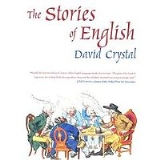
The Stories of English
Encyclopedia
The Stories of English is a 2004 book by British
linguist
David Crystal
; it traces the history of the English language
from the invasion of Great Britain
by the Angles
and Saxons
in the 5th Century to the modern splintering of the language into its modern British
, American
, Indian
, Australian
, and other dialects.
One primary focus of the book is a history of British English, from its Old English beginnings to Middle English
, Early Modern English
, and Modern English
. Crystal also argues eloquently for the inclusion of dialects and "non-standard" varieties of English. Even for the Old English period, he shows how the available evidence can be used to determine what dialectal variation existed.
Finally, Crystal condemns what he sees as the over-abundance of linguistic prescription
in the study of English, especially that which existed from the 18th Century to the 20th. He speaks approvingly of the recent shift of focus in English language education away from prescriptivism.
United Kingdom
The United Kingdom of Great Britain and Northern IrelandIn the United Kingdom and Dependencies, other languages have been officially recognised as legitimate autochthonous languages under the European Charter for Regional or Minority Languages...
linguist
Linguistics
Linguistics is the scientific study of human language. Linguistics can be broadly broken into three categories or subfields of study: language form, language meaning, and language in context....
David Crystal
David Crystal
David Crystal OBE FLSW FBA is a linguist, academic and author.-Background and career:Crystal was born in Lisburn, Northern Ireland. He grew up in Holyhead, North Wales, and Liverpool, England where he attended St Mary's College from 1951....
; it traces the history of the English language
English language
English is a West Germanic language that arose in the Anglo-Saxon kingdoms of England and spread into what was to become south-east Scotland under the influence of the Anglian medieval kingdom of Northumbria...
from the invasion of Great Britain
Great Britain
Great Britain or Britain is an island situated to the northwest of Continental Europe. It is the ninth largest island in the world, and the largest European island, as well as the largest of the British Isles...
by the Angles
Angles
The Angles is a modern English term for a Germanic people who took their name from the ancestral cultural region of Angeln, a district located in Schleswig-Holstein, Germany...
and Saxons
Saxons
The Saxons were a confederation of Germanic tribes originating on the North German plain. The Saxons earliest known area of settlement is Northern Albingia, an area approximately that of modern Holstein...
in the 5th Century to the modern splintering of the language into its modern British
British English
British English, or English , is the broad term used to distinguish the forms of the English language used in the United Kingdom from forms used elsewhere...
, American
American English
American English is a set of dialects of the English language used mostly in the United States. Approximately two-thirds of the world's native speakers of English live in the United States....
, Indian
Indian English
Indian English is an umbrella term used to describe dialects of the English language spoken primarily in the Republic of India.As a result of British colonial rule until Indian independence in 1947 English is an official language of India and is widely used in both spoken and literary contexts...
, Australian
Australian English
Australian English is the name given to the group of dialects spoken in Australia that form a major variety of the English language....
, and other dialects.
One primary focus of the book is a history of British English, from its Old English beginnings to Middle English
Middle English
Middle English is the stage in the history of the English language during the High and Late Middle Ages, or roughly during the four centuries between the late 11th and the late 15th century....
, Early Modern English
Early Modern English
Early Modern English is the stage of the English language used from about the end of the Middle English period to 1650. Thus, the first edition of the King James Bible and the works of William Shakespeare both belong to the late phase of Early Modern English...
, and Modern English
Modern English
Modern English is the form of the English language spoken since the Great Vowel Shift in England, completed in roughly 1550.Despite some differences in vocabulary, texts from the early 17th century, such as the works of William Shakespeare and the King James Bible, are considered to be in Modern...
. Crystal also argues eloquently for the inclusion of dialects and "non-standard" varieties of English. Even for the Old English period, he shows how the available evidence can be used to determine what dialectal variation existed.
Finally, Crystal condemns what he sees as the over-abundance of linguistic prescription
Linguistic prescription
In linguistics, prescription denotes normative practices on such aspects of language use as spelling, grammar, pronunciation, and syntax. It includes judgments on what usages are socially proper and politically correct...
in the study of English, especially that which existed from the 18th Century to the 20th. He speaks approvingly of the recent shift of focus in English language education away from prescriptivism.

